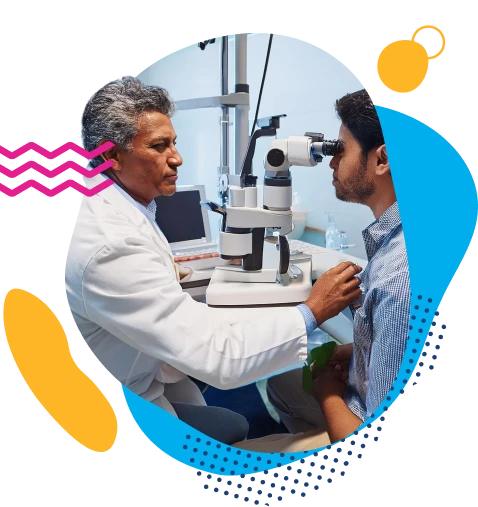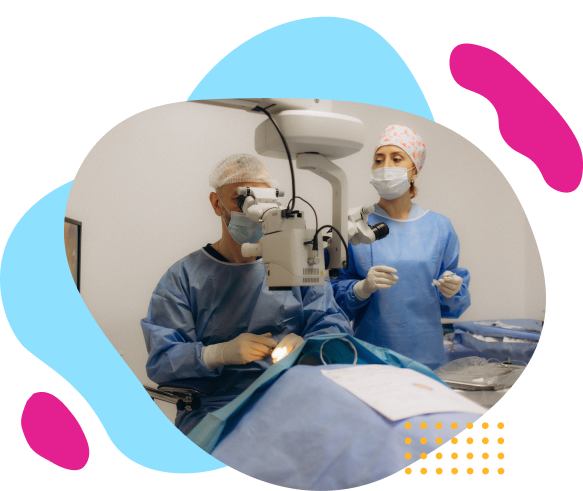


About
Glaucoma

Symptoms
What Your Eyes Might Be Trying
to Tell You
- Gradual loss of peripheral (side) vision, usually in both eyes
- Tunnel vision in the advanced stages
- Severe eye pain (in acute angle-closure glaucoma)
- Sudden onset of visual disturbances, especially in low light
- Blurred vision
- Halos around lights
- Redness in the eye
- Nausea and vomiting (often accompanying acute eye pain)


Treatments
Where Science Meets
Sight-Saving Solutions
Glaucoma treatment focuses on lowering eye pressure to protect your optic nerve and preserve the vision you have.
- Prescription Eye Drops – Assists in lowering intraocular pressure by either reducing fluid production or enhancing drainage.
- Oral Medications – These are indicated when topical therapies are insufficient; they help control eye pressure at a systemic level. Examples include Timolol (Betimol, Istalol, Timoptic) and Betaxolol (Betoptic S).
- Laser Therapy – Procedures such as trabeculoplasty enhance fluid outflow, particularly for patients with open-angle glaucoma.
- Microsurgery (Trabeculectomy) – In more advanced, unresponsive cases, a new drainage route is constructed to reduce eye pressure.
- Minimally Invasive Glaucoma Surgery (MIGS) – Novel techniques that are less invasive, have a quicker recovery time and have fewer complications.
- Ongoing Monitoring & Eye Exams – Consistent appointments are necessary to adapt treatments and monitor disease status over time.
Why Choose Maxivision?
See Why We’re
Testimonial
Very good eye hospital. Procedures and processes are highly scientific. I am extremely happy with Maxivision Eye Hospital.
It was a good experience and hassle-free. Doctors are very good; they explain all our doubts clearly. We will definitely recommend others as well.
I visited Maxivision Super Speciality Eye Hospital for my father’s cataract surgery. From the friendly staff at reception to the doctor’s clear and reassuring explanation, the entire experience was smooth. The surgery was quick and painless, and the post-care team followed up to ensure he was comfortable. Within days, my father could see clearly again and was thankful for the professional and compassionate service.
The process at Maxivision Hospital is so neat and well organized. Staff was very good in receiving and guiding us through the next steps. The doctor’s treatment was also excellent. The doctor explained the cause of the pain and how we could manage it naturally as well.
I had a fantastic experience at Maxivision Super Speciality Eye Hospital in Kukatpally! The hospital’s facilities are top-notch, and the staff is incredibly friendly and helpful. The doctors are highly knowledgeable and took the time to explain my treatment options clearly. The surgery was a success, and I’m thrilled with the results. Overall, I highly recommend Maxivision Super Speciality Eye Hospital to anyone seeking quality eye care. They truly live up to their reputation as a super speciality eye hospital!
The staff were the best—very supportive, detail-oriented, and happy to help every client. Would definitely recommend this hospital for eye check-ups and eye-related issues. Thank you Maxivision for a wonderful treatment.
Faq’s?
How does glaucoma cause vision loss?
Glaucoma is caused by high levels of pressure within the eye. This intraocular pressure (IOP) presses on the optic nerve, causing damage and eventually leading to permanent vision loss.
Why is glaucoma called ‘The Silent Thief of Sight’?
Glaucoma has been nicknamed the silent thief of sight because it often causes permanent vision loss before the disease is even detected. In its early stages, glaucoma does not typically present with any symptoms that would send you to your eye doctor with complaints of vision changes. Therefore, by the time you see your eye doctor, a large amount of vision loss has already occurred.
What is ‘tunnel vision’?
If glaucoma is not effectively controlled at an early stage, the disease can cause severe peripheral vision loss, resulting in a condition called ‘tunnel vision’. Tunnel vision blocks your ‘side vision’, and limits your field of vision to strictly seeing images in your central vision, or straight ahead.
Will glaucoma affect all of my vision?
Peripheral vision is affected first, and if not effectively controlled at this point, can result in tunnel vision. As the disease progresses, central vision is affected next, leaving the person with partial or complete permanent vision loss.
How common is glaucoma?
Glaucoma affects more than 70 million people worldwide. Glaucoma is a leading cause of irreversible blindness and accounts for 12.3% of global blindness. Glaucoma affects up to 5% of adults aged 70 and above and increases to over 9% for those 80 and older.
Can stress worsen glaucoma?
Yes, stress can elevate intraocular pressure, which may aggravate glaucoma.
Is glaucoma surgery permanent?
While surgery can significantly lower eye pressure, regular follow-ups are necessary as pressure may fluctuate.
Can glaucoma develop suddenly?
Yes, acute angle-closure glaucoma can develop suddenly and require emergency treatment.
Your Eye Care Matters:
Book Your Appointment Now!

 Call Us:
Call Us: 



